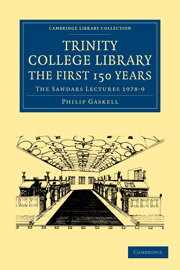Book contents
- Frontmatter
- Contents
- Lists of illustrations and plans
- Preface
- Terms and conventions
- Abbreviations
- 1546–1600
- 1 College libraries in the sixteenth century
- 2 The libraries of Michaelhouse and the King's Hall
- 3 The establishment of Trinity College Library
- 4 The need for books at Trinity in the sixteenth century
- 5 The College Library in the mid-sixteenth century
- 6 The College Library in 1600
- 7 The development of the collection up to 1600
- 8 Private libraries
- 1601–1695
- APPENDIXES
- Index
- Frontmatter
- Contents
- Lists of illustrations and plans
- Preface
- Terms and conventions
- Abbreviations
- 1546–1600
- 1 College libraries in the sixteenth century
- 2 The libraries of Michaelhouse and the King's Hall
- 3 The establishment of Trinity College Library
- 4 The need for books at Trinity in the sixteenth century
- 5 The College Library in the mid-sixteenth century
- 6 The College Library in 1600
- 7 The development of the collection up to 1600
- 8 Private libraries
- 1601–1695
- APPENDIXES
- Index
Summary
Since the early Fellows of Trinity could not rely solely on the College Library for access to the academic books that they needed for their work, they also bought books for themselves. University men had indeed owned academic books before the mid-sixteenth century, though not apparently in large numbers. Seventeen of the wills of senior members of Cambridge colleges that were registered in the Vice-Chancellor's Court from 1502 to 1526 referred specifically to books. Sixteen of them mentioned from 2 to 16 titles, average 6; the seventeenth, that of Thomas Colier of Michael-house, mentioned 47.2 These testators may have owned a few more books than they mentioned in their wills, but probably not many: books were not yet easy to come by, and the college libraries still met most of their needs.
But the college libraries then failed to keep up with the need for new books, and by the middle of the sixteenth century, when new books could more readily be bought, the private libraries of individual fellows were much larger than before. The wills of twenty Fellows of Trinity were proved in the Vice-Chancellor's Court from 1550 to 1589, and for thirteen of them detailed probate inventories survive. All thirteen inventories described substantial private libraries, ranging in size from about 45 to about 162 books, average 105. The College Library itself may have had no more than 162 titles at the time; and, although these private libraries contained more small, cheap books than the College Library is likely to have done – mostly the little text-books used for teaching the junior courses – they also contained many substantial, expensive works of scholarship.
- Type
- Chapter
- Information
- Trinity College Library. The First 150 YearsThe Sandars Lectures 1978–9, pp. 51 - 58Publisher: Cambridge University PressPrint publication year: 2010First published in: 1980

